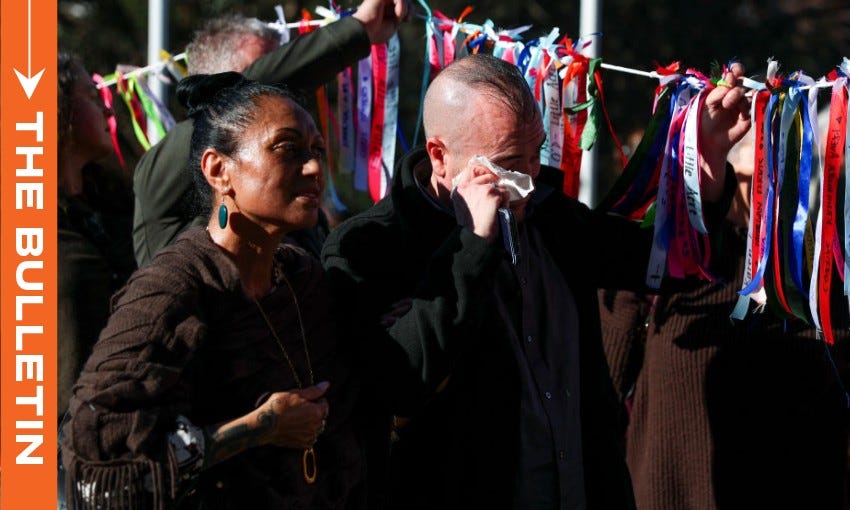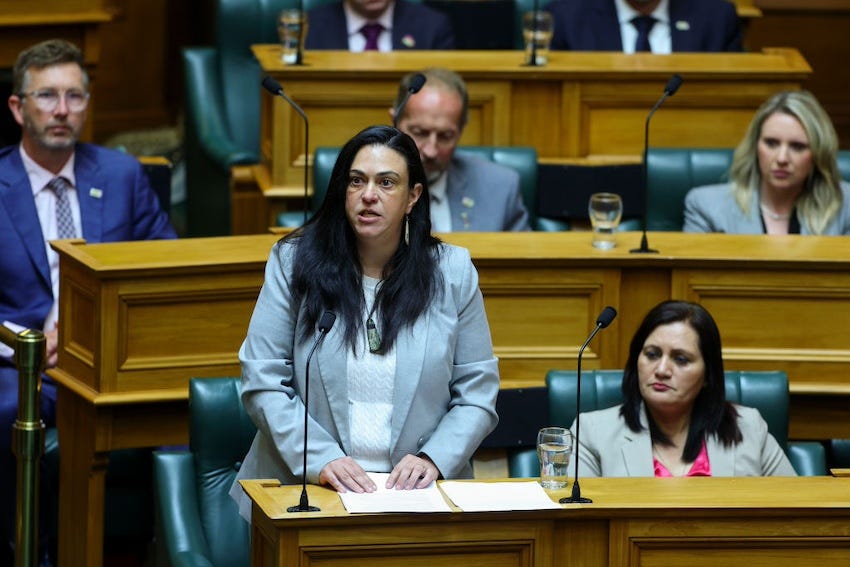10 questions about the abuse in care inquiry asked and answered
For the first time, the state admitted some of the abuse suffered amounted to torture.
Mōrena, and welcome to The Bulletin for Thursday, July 25.
In today’s special edition: The most essential reads after the final report from the Royal Commission into Abuse in Care was released. Plus: a bonus episode of Juggernaut, and the Olympics have started with a spying scandal.
In yesterday’s Bulletin we looked back at the years-long journey behind the Royal Commission of Inquiry into Abuse in Care, and what it might recommend once made public. At 4pm yesterday, the 3,000-page report was formally released, with MPs from across parliament uniting in condemnation of the abuse of an estimated 200,000 New Zealanders – and for the first time, admitting some of that abuse amounted to torture.
What did the review recommend?
In short, a lot. The Spinoff’s Lyric Waiwiri-Smith has summarised the 138 recommendations made by the Royal Commission which, as she notes, could have mammoth ramifications if actioned. The report calls for a range of apologies from senior figures, including the prime minister and key leaders of multiple faith-based charitable and educational organisations, as well as government departments.
Christopher Luxon led the government apology in parliament yesterday, but a formal, cross-party apology will be made in November – by which time it’s anticipated the government will be in a position to respond to some of the recommendations, with others to be addressed next year. The report also urged a comprehensive redress scheme be set up through which compensation be paid to survivors and their families, including a $10,000 payment to children of survivors to prevent further intergenerational harm caused by abuse in care. In The Post this morning, Thomas Manch looks at the question of financial redress, with the government not making its position clear at this stage.
Who bears responsibility?
A number of figures have been found at fault for failing to stop the abuse in care while it was happening. Clearly, these are not those responsible for carrying out physical abuse, but they are found to have enabled it in some way. One consistent theme of yesterday’s government response – more on that below – was that the state, over decades, had failed New Zealanders. The Spinoff’s Joel MacManus has meticulously combed through the records to find the many ministers and senior leaders referenced by the report, given the Royal Commission only referred to them by job title.
It includes former high-profile MPs like prime ministers Helen Clark, Bill English and Jenny Shipley (each of whom served as a minister of health) along with churches and religious leaders, including the Pope.
How did the government respond?
As mentioned, the formal political apology to the survivors and their whānau will be made in November. However, a debate on the report in parliament yesterday saw political leaders from across the parliamentary spectrum react with awe and emotion at the Royal Commission’s findings. 1News’ Felix Desmarais wrapped the responses of key leaders, such as prime minister Christopher Luxon, who thanked the survivors for their bravery and strength. “You are heard and you are believed,” he said.
There are a lot of recommendations the government has been encouraged to swiftly adopt. Not all of them will be easy, or even desirable, for the coalition. The Herald’s Derek Cheng looks at what parts of the inquiry could be trickiest to address, such as those that appear to be in conflict with the government’s views on gang policy. The Royal Commission concluded that state care, in many instances, provided a direct pipeline into gang life or prison. When an emotional Karen Chhour, the children’s minister, was speaking in parliament, she was heckled with a call: “no boot camps”.
Did we learn anything more about the level of abuse?
We already knew that thousands of people were abused while in state care. But, for the first time, the government openly called the abuse suffered by some of those “torture”, reported Newsroom’s Laura Walters. Previously, the government of the day has refused to go this far. That’s because, while torture can often be used interchangeably with abuse, it carries a distinct meaning under a United Nations convention. “To the survivors of Lake Alice – some of whom are here today – thank you for your determination to ensure what you suffered was brought to light,” Luxon said in parliament.
Those in the care of the psychiatric facility were subjected to electric shocks without anaesthetic and given painful and immobilising paraldehyde injections. Allegedly for medical purposes, the report makes clear that these methods were actually used for punishment, Walters reported.
Show your support, join up today!
"Thank you to The Spinoff team for a balanced news, arts, culture, society, for the (mostly) clear sighted writing and, especially, for the intelligent satire. There needs to be space to be able to laugh" – From a Spinoff member.
If you've appreciated our political satire, as well as our journalism, please consider becoming a member today.
How have survivors reacted?
It’s impossible to summarise how all survivors feel given the level of abuse and the different experiences of each individual. Nevertheless, the response observed in the media has varied. Writing for The Spinoff, abuse survivor Steve Goodlass expressed concern over what he saw as omissions in the report. “The status quo with the Crown holding all the power remains,” he said, in response to a recommendation he saw as giving the government an “out” in terms of earlier recommendations to amend the civil litigation framework.
Others, such as those interviewed by Jenna Lynch for ThreeNews, were optimistic after the long journey to reach a resolution. Keith Wiffin, who was a member of the Royal Commission’s survivor advisory group and a key figure in persuading the Labour government to launch an inquiry, told the Herald’s Isaac Davison that yesterday was “incredibly emotional” and, at times, overwhelming. “But … I’m pretty happy that this day has finally happened.”
What about the response from other groups?
A number of other non-political groups and figures also responded to the report’s release. The Spinoff has collated these here. Among them is Lady Tureiti Moxon, chair of the National Urban Māori Authority, who said: “The true test of whether the government will whakatika, put right the wrong, is if they accept and implement the 138 recommendations.”
Did things take too long?
The Royal Commission was critical of the time it took for political leaders to respond to previously made recommendations, reported RNZ, such as those around redress from a 2021 interim report. "There has been very little clear progress by the government in implementing the inquiry's recommendations," the commissioners said. There were also numerous delays to the final report being made public.
It was the previous Labour government that launched the Royal Commission of Inquiry. Chris Hipkins, who led the Crown’s response to the inquiry as minister of state services before becoming prime minister, admitted the slow pace and issued a challenge to the coalition. “We didn't do enough and the ball now falls to you and your government,” he said. “This must be bigger than politics.”
What did the inquiry tell us about the role of te tiriti?
Te Ao Māori News explained that Māori dominated the devastating statistics from the inquiry, representing over 70% of those in state care. One survivor told the outlet she was struggling to reckon with a state apology when other forms of “institutionalisation” were still being carried out.
Writing for the The Spinoff today, Liam Rātana explains that there were two recommendations in the report directly pertaining to te Tiriti o Waitangi, including that those involved in implementing the inquiry’s recommendations should give effect to it. As Rātana notes, that could make the response from the likes of David Seymour and Shane Jones especially interesting given their public views on the Treaty and its principles. It was signalled recently that Seymour’s proposed Treaty Principles Bill could be made public this week, while his party – Act – launched a donations drive centred on the impending release.
What did the Jehovah’s Witnesses want to be kept secret?
In yesterday’s Bulletin I shared a report about a last-ditch effort by the Jehovah Witnesses to have aspects of the inquiry’s report pertaining to them kept secret. Now, as The Spinoff’s Toby Manhire reports, we know what they wanted to stay hidden. He reports this morning on a 64-page case study in the report concerning the Jehovah’s, which included details of abuse, the fear felt by survivors and the “arcane investigation process” followed by the church.
What else can I read or listen to?
There are simply too many reports to be shared in one Bulletin, but my starting advice would be: read the report, or as much of it as you can. ThreeNews’ Jenna Lynch, in her report last night, said it should be “compulsory” reading for anyone working with young or vulnerable people.
If you missed it, The Spinoff published a number of features from the Royal Commission across 2022 and 2023 as part of our Quarter Million series. I encourage you to take the time to read them and I think they take on an extra layer of significance in the wake of the report’s release. If you prefer to listen, the latest episode of The Detail includes an interview with freelance journalist Aaron Smale, who has extensively covered the inquiry, while a new episode of The Spinoff’s politics podcast Gone by Lunchtime analyses some of the key aspects of the report.
A bonus, extra for experts episode of Juggernaut
Ross Vintiner was right by David Lange's side in opposition and in government as his head of press. If you enjoyed the Juggernaut series on the fourth Labour government, you'll enjoy his insights into the singular figure of Lange and the whirl of the ninth floor across those wild years.
Listen below or wherever you find your podcasts.
Click and Collect
New Zealand’s Olympic campaign has kicked off with a win over Guinea by the men’s football side, while Canada’s assistant women’s football coach and a team analyst are being sent home after twice spying on the New Zealand team with a drone.
More on the Olympics: Newsroom picks seven New Zealanders to keep an eye on and the Herald analyses our best medal chances.
MPs respond to petition for law changes to protect adult entertainers.
Former health minister Andrew Little, who oversaw the launch of Te Whatu Ora Health NZ, has responded to the government’s decision to appoint a commissioner in charge of the agency.
I enjoyed this feature in The Press about the “boy from Aranui” heading to the Los Angeles World of Dance finals.
Sue Copsey reveals the classic New Zealand novel she didn't finish for The Spinoff Books Confessional. Alex Casey talks to Jemaine Clement about the Wairarapa landmark he tried to sneak into new show Time Bandits. Liam Rātana has ten important takeaways from the first ever Where are the Māori Audiences report, and also reflects on the mana of digging a grave.
Pop culture picks, with Alex Casey
What you should be reading from the world of entertainment this week.
For those who still can't stop thinking about Longlegs, the scariest movie of the year so far, I really enjoyed this deep dive on why Nicholas Cage's face just looks so damn scary in it. Looking forward to seeing lots of people turning out their dirtiest white jeans and pale pink neckerchiefs this Halloween!
Everyone's gearing up for the Olympics which means athletes around the world are also dusting off their TikTok accounts and furiously jumping on cardboard beds to show off the unseen bits of life in the Olympic village. Vulture has a good wrap up of the people worth following.
It's Death Week on The Spinoff, but it would appear Keanu Reeves is thinking about death more than all of us ahead of the launch of his first novel. "Hopefully it's not crippling, but hopefully it's sensitised [us] to an appreciation of the breath we have, and the relationships that we have the potential to have."
That’s it for today, thanks for reading. I’ll see you back here tomorrow morning.
Let me know in the comments, or get in touch with me at thebulletin@thespinoff.co.nz, if you have any feedback on today’s issue or anything in the news.
If you liked what you read today, share The Bulletin with friends, family and colleagues.

















It will take some time for the full effects of this report to be absorbed, and I hope the public don't let the politicians of any stripe shove it onto the back shelf & not address the remedies. As always, it is what we do NEXT that matters now.